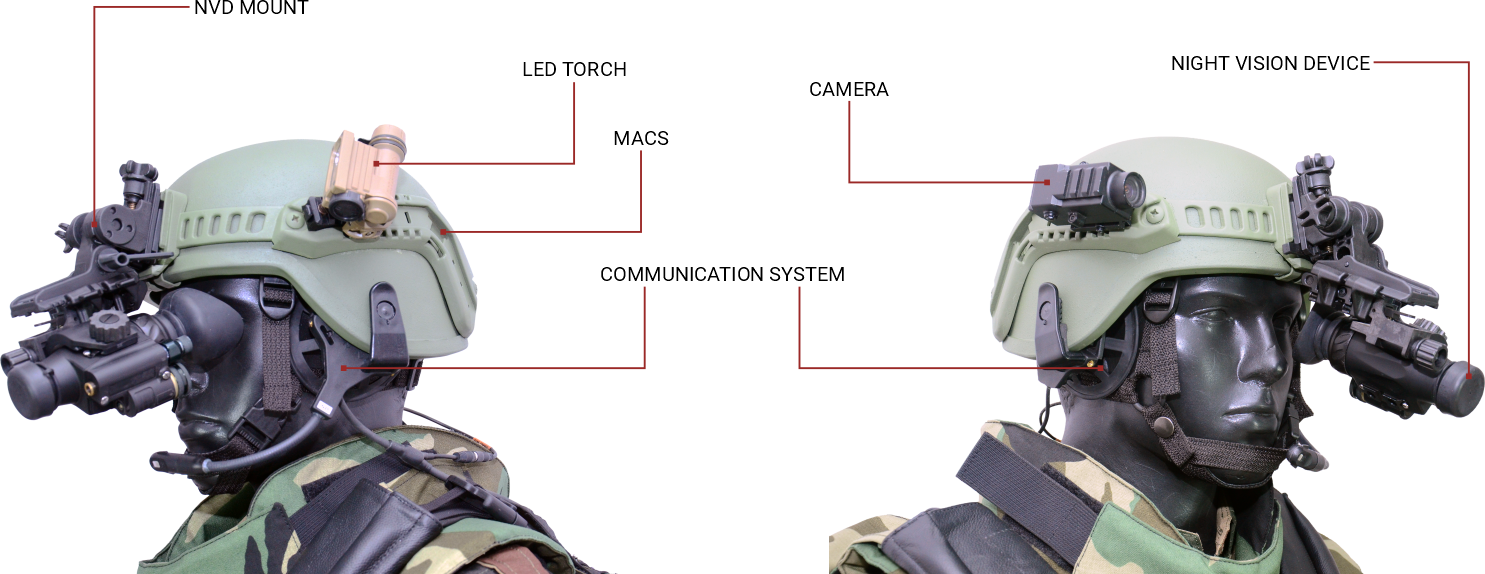Our brave soldiers persistently live on the edge. Combatting in extreme conditions and conquering their inner fears while serving the nation has always been challenging. Their duties are physically demanding, and any addition to the weight carried generates considerable impairment to the endurance of the soldiers. Therefore, shielding them from various injuries is essential to survivability, and in this context, it is imperative to give them ensured ballistic protection with posture-oriented head stability to provide complete protection as well as comfort. Hence, keeping a ballistic helmet stably lodged on the head is equally important than just wearing/dangling it. A soldier has to undertake several complex maneuvers during warfare scenarios and it is important for the helmet to not generate unduly noise and be stable in various positions while combatting be it kneeling or standing, etc.
During a combat operation, a snug comfortable fit along with heightened situational and sensory awareness is a topmost benefit required from any ballistic helmet however ensuring stability and liberty of adjustment according to the form factor of the soldier's skull 360-degree uniform clenching. Various factors are a prime consideration while designing a ballistic helmet including comfort, weight, stability, fit, and maintainability. These factors affect soldiers' performance & combat posture during an operation; therefore, it is important to know about soldiers' real-life experiences with helmets for assessing a helmet's overall protective efficacy.

Ballistic helmet with all communication systems
Combat posture & Head Movement-
More than providing head protection, today combat helmets have become a mounting platform for various devices such as night-vision devices, weapon aiming systems. Although these devices are intended to enhance the soldier's performance during diverse combat situations, wearing a ballistic helmet commonly coordinated with various mounted devices often imposes a load to the neck of a soldier and makes his postures restrictive. Thus, during combat, when a soldier is lying in a prone position, he should be able to lift and rotate his head freely and the combination of helmet and eye protection should cause a minimum of discomfort. It is necessary when mounted on the helmet and in combination with the appropriate counterweight, the mounted devices should remain in front of the user’s eye after rigorous head motion. Specific consideration ought to be taken of the communication system or mounted devices on the helmet to avoid free-hanging wires or cables which may entangle and can interrupt the head movement and support of a soldier.
Helmet sizing and fitting-
Today, head protectors are intended to give substantially more than ballistic assurance. There are many instances of uncomfortable helmet designs that don't oblige the head movement of the soldiers, if the helmet sits too high the danger of instability increases and if the helmet sits excessively low on the soldier's head, it may obstruct the soldier's vision. Thus, defensive headgear can influence the performance of the soldiers drastically. Traditionally, there have been two different ways for deciding the size and fit of the helmet: (a) beginning with the essential size and using grade rules to foresee higher sizes, and (b) anthropometric estimating, where anthropometric techniques are responsible for the head circumference variation yet it still doesn't consider the variation in head curvature. Even when a helmet is adjustable to a proper fit for various head sizes, the stability of the helmet should be maintained in all combat situations.
Center of gravity-
The ideal area for any weight on the head is in a straight line, interfacing the center of gravity (CG) of the head. Any movement in the weight balance on the head from the natural CG will cause stress and weakness of the neck muscles. It will also restrict the body's balance during different physical activities, like running, squatting, walking, or strolling, because of the muscular accommodations required. The extent of the center of gravity (CG) balance force is relative to the CG balance separation, speeding up, and helmet/head mass. Thus, it is imperative to have the smallest space between the CG of the helmet and the CG of the head.
A
combat helmet gives the soldier fundamental ballistic and impact assurance however Technological advancements in recent times have increased the weight of ancillary equipment used by the Military, Police, Law enforcement, and Special Forces. Therefore, it is important to have lightweight ballistic solutions and other mounting equipment that enhance the comfort of the soldier and let them operate with ease and confidence.
At MKU, we understand that the safety of soldiers cannot be compromised. We design and develop our helmets by understanding the user's requirements, the genuine fit of the helmet, comfort level, and other benefits required in actual combats. Our commitment to quality defines ballistic performance, safety, stability, and comfort effectiveness in our helmet systems. Our
Macromatrix technology in Helmet ensures excellent protection and ergonomics for added comfort. Our patented Twist fit harness system singularly renders all the above attributes making it a unique and indispensable component of a soldier’s helmet system, offering a precise custom fit to the micro-level.
To Know more about MKU’s Ballistic helmets range,
click here.